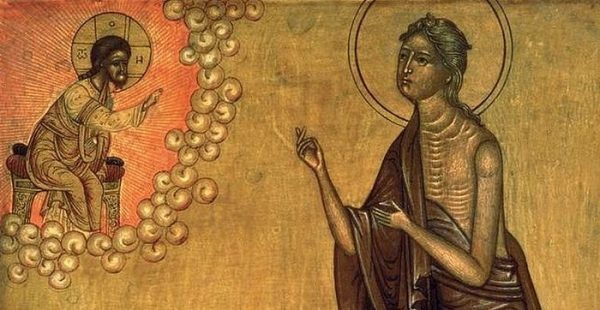“Through thy sinful actions, you drew near to the gates of destruction; but He who of old broke in pieces the gates of hell by the power of His Godhead, opened to you the gates of repentance O all honored Saint…for He is Himself the Gate of Life.”
As we now are just one week away from Holy Week. One week away from experiencing what that “Gate of Life” has done for us.
On this last Sunday of Great Lent, we are presented in the Church with the life of St. Mary of Egypt. We are given the story of a woman who, as we heard in the hymn above, was at the brink of destruction. She spent her early life as a harlot that would put even the worst of them to shame, but our Lord worked a miracle in her life that awoke her conscience and her soul. St. Mary went from living in darkness to (as the church so eloquently says in the matins service) “a woman who has become godlike through her holy actions”.
We have so many lives of the saints that we celebrate throughout the year in the Orthodox Church, which led to an interesting question that was posed to me this past week: “Why does St. Mary of Egypt get so much attention paid to her on this 5th Sunday of Great Lent?” We were here last Thursday with our ears perked up in the Church as we listened for 50 minutes about the incredible life of this sinful woman turned a Saint. The services for this weekend all have some beautiful poetry that sing the praises St. Mary and lifts her up as this incredible “shining star from Egypt”.
Why is she so highly praised and regarded as one who truly stands out as unique among the so many other saints who we celebrate?
There is a very ancient prayer from the 4th century that has become the most recognizable prayer for Orthodox Christians during Great Lent called the prayer of St. Ephraim. It describes and directs us on what we are to focus on as we enter the Great Fast:
“O Lord and Master of my life, take from me the spirit of sloth, despair, lust of power, and idle talk. But give rather the spirit of chastity…humility…patience…and love of Thy Servant. Yea O Lord and King, grant me to see my own transgressions and not to judge my brother, for blessed art Thou unto the ages of ages, amen.”
St. Mary was one who not only gained and lived the virtues that we so desperately seek after in this prayer…she performed all of them to the extreme!
Humility: Even the way that we read her life, we don’t even know that it is about her until a quarter of the way through! The story begins with St. Zosima who is searching for someone to teach him what it means to live a Holy Life! When he finally meets St. Mary in the desert, he sees this woman who levitated when she prayed. He comes face to face with a woman who knew details about Zosima despite never meeting him before. He saw with his own eyes someone who walked on the Jordan river like Christ. Despite all of these incredible things, we see the humility of St. Mary in her very first encounter with a human soul in 47 years! She fell down before Zosima, and continued to ask him to “bless her” over and over!
Patience: We think that in this past year* of trials brought on by a virus that being away from the Church, not being able to receive the Eucharist as often as we are typically blessed to do, and having to wear an uncomfortable mask for a short time while praying together was difficult? St. Mary spent 47 years in the dessert waiting for St. Zosima to come and to receive the Divine Mysteries of God! 47 years fighting internal demons like wild beasts! 47 years without seeing another human soul! 47 years learning what repentance and patience truly look like!
Love: She would not have gone to such great lengths to purify herself if she did not have a love for God, a love for the blessed Mother, a love for the Saints, and a love for others…as she continually prayed for all of them while in the desert.
These are all easy virtues to explain with St. Mary’s life, but the one I want to speak the most on is what St. Ephraim calls “chastity”. It is a common mistake, especially when thinking of the repentance of St. Mary of Egypt, to think that chastity refers to “sexual purity”. It goes so much further beyond that!
The Greek word used in St. Ephraim’s prayer is “Sophrosini, which is literally translated “sanity”. When we read the prayer, we are asking God for the spirit of sanity! For our minds to be made whole! To live a sober life and to not be “insane”!
St. Mary of Egypt, even by today’s crude moral standards lived a completely insane life. What kind of healthy person would do the kind of things that she did and for the reasons that she did them? In her own words she described her early life by saying:
“I had an insatiable desire and an irrepressible passion for lying in filth. This was life to me! Every kind of abuse of nature I regarded as life…and this is how I lived……how the earth did not open up its jaws, and how it was that hell did not swallow me alive, when I had entangled so many souls into my net.”
Mary tried to find happiness and fulfilment in her own passions, and came so close to the gates of destruction. But when she tried to come into the presence of Holiness…into the presence of God through His Life-Giving cross in Jerusalem…she “came to herself”. She snapped out of her insanity and began to think clearly for the first time! She changed her life in such an extreme way, that she is now held as an example to the entire world on what it means to be sane!
Brothers and Sisters in Christ, if you are to take one thing from this homily this morning, it is this: True and full happiness and satisfaction cannot be found in the world…but only in the love of God. To think otherwise is insanity.
It is in the Church where our minds are made clear. Perhaps this past year* has been given to us to remind us of what happens to our lives when we are temporarily separated from being in the presence of God through His sacraments and in His Church. We have all gained a deeper appreciation during these trials for the true gift that the Church is to us.
Holy Week begins later this week dear ones! May our Lord help us to approach it, not just with repentance, not just with humility, not just with patience, not just with love, but with the thing that all of those virtues lead us to: “Saintly Sanity.”
*Note: this article was written in 2021.

















